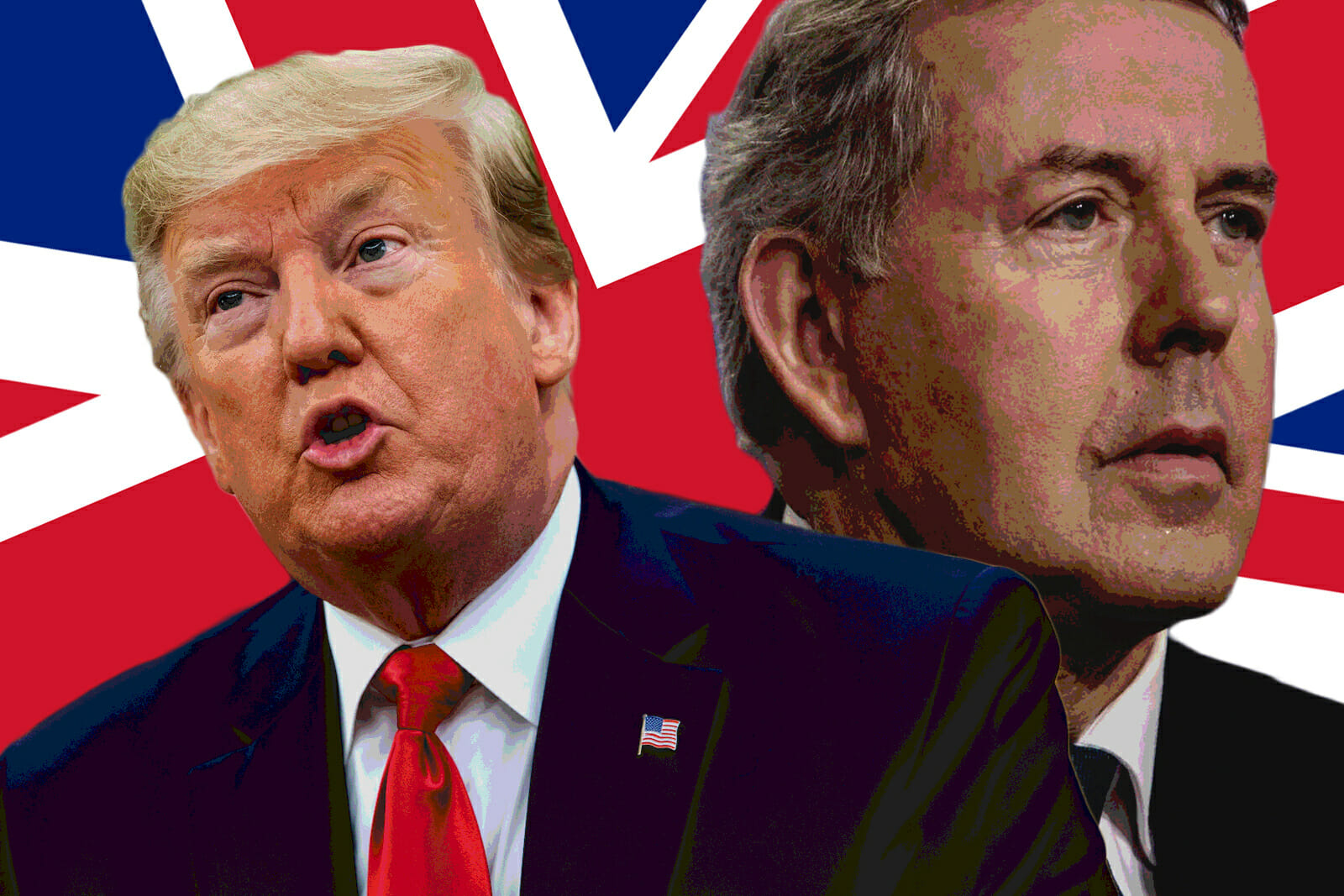
With Allies Like These, Who Needs Enemies?
In the late summer of 1888, the century-old dispute between the United States and Great Britain over fishing rights off Canada’s eastern coast grew more tense than usual when the Republican Senate voted down a treaty submitted by Democratic President Grover Cleveland. Having vetoed more bills than all his predecessors combined, Cleveland now found himself on the losing side of another battle with Congress. To save face, the president demanded that Congress grant him the power to “suspend by proclamation the operation of all laws and regulations permitting transit of wares, good and merchandise in bond or across or over the territory of the United States to or from Canada.” On September 4, a California Republican of English descent, named George Osgoodby, wrote a letter to the British Ambassador to the United States, Lord Sackville-West. Under the pseudonym “Charles F. Murchison,” Osgoodby asked Sackville-West how he should vote in the upcoming presidential election between Cleveland and Benjamin Harrison. Before Cleveland had made his fiery demand, Osgoodby “was sure Mr. Cleveland was the man.” After the incident, Osgoodby said he was “unable to understand for whom I shall cast my ballot.” Since Sackville-West was “the fountain-head of knowledge on the question,” Osgoodby asked if Cleveland’s demand was only “temporary” and would be suspended for a policy “of friendship and free trade” once the election was over?
Nine days later, Sackville-West drafted a reply to “Murchison.” While diplomatically dancing around the difficulty of the situation, the ambassador concluded it was impossible to truly know Cleveland’s position but there was “every reason to believe that, while upholding the position he has taken, he will manifest a spirit of conciliation in dealing with the question involved in this measure.” In short, Sackville-West said yes, Mr. Murchison should vote to re-elect the president.
While such strong British support for an American presidential candidate may have boosted their electoral chances in the 20th century, support from the British in fin-de-siècle America was a candidate’s death knell. At the time, the US and Great Britain were competitors, not allies. The vibrant Irish community that had immigrated to the US did not help curb America’s Anglophobia. So, when leaders of the California Republican State Executive Committee heard of the letter and its content, they rushed to publish it. Two weeks before the election, the Los Angeles Times published Osgoodby’s letter and Sackville-West’s response under the title, “The Anglo-Democratic Alliance.” Cleveland’s prior electoral foe, James G. Blaine, “made the fullest use of West’s letter to claim confrontation of the often-made charge that Cleveland was over-friendly to England.” When Cleveland lost the election in early November, numerous pundits and future historians would attribute his defeat to the publication of the Murchison letter—some considering it “the decisive factor in the election.” Cleveland seemed to agree. Since Sackville-West had made the cardinal mistake of interfering in foreign elections, Cleveland’s Secretary of State, Thomas F. Bayard, requested that London recall Sackville-West. When British Prime Minister Lord Salisbury refused to respond, Sackville-West was declared persona non grata. Shortly after, he left the US and his profession.
131 year later, this diplomatic incident seems oddly familiar. While Britain’s domestic election interference perhaps better resembles Russia’s involvement in the 2016 US presidential election, Anglo-American tension has once again resurfaced after another British Ambassador to the US, Sir Kim Darroch, called the Trump administration “inept,” “clumsy,” and “dysfunctional” in a set of—once again—leaked correspondence. With an American president pettier than Cleveland, Trump lodged a Twitter tirade against the “very stupid” Darroch and “foolish” Prime Minister May. Trump said he would no longer deal with the “wacky” Darroch, who was also a “very stupid guy” and a “pompous fool.” After being disinvited to events around Washington, and essentially declared persona non grata by the US president, Darroch announced his resignation as ambassador on July 10.
Since the 1888 Murchison affair, this Western alliance has never experienced such a public spat at the highest levels of diplomacy as it has this past month. Searching through the archives of the New York Times and the Washington Post, it was difficult to find an instance where any foreign diplomatic official insulted a US president outright or through leaked cables, let alone a British diplomat. In 1979, Israeli Ambassador to the US, Simcha Dinitz, announced his resignation by “criticizing President Carter’s role in the recent Middle East negotiations” at a meeting of the Council of Presidents of Major American Jewish Organizations. Another example occurred between the US and China in 1983, at a time when “Chinese-American relations had developed rapidly.” Chinese Ambassador to the US, Zhang Wenjin, accused the Reagan White House of “‘twisting the meaning’ of the communiqué” they had signed in August 1982 that limited US arms sales to Taiwan.” Yet in both instances, Presidents Carter and Reagan, respectively, overlooked this foreign criticism.
Trump? Not so much. Not only did he castigate Darroch and provoke his resignation, but he also criticized May and her entire government for their incompetence during Brexit negotiations.
In reflecting on this recent affair, David Reynolds, a professor at the University of Cambridge, who has spent many years chronicling the Anglo-American relationship, wrote in the Wall Street Journal that the “attack on Mr. Darroch…reveals a good deal about the current state of the U.S.-U.K. ‘special relationship.’” Reynolds then traces the amusing twists and turns of this alliance. Both countries have valued the other as a critical partner in spreading Western values and maintaining peace ever since World War II. Since the famed friendship of Roosevelt and Churchill, the Anglo-American relationship has enjoyed highs like Reagan and Thatcher or Bush and Blair; and lows like LBJ and Wilson or Nixon and Heath. Yet through 70 years of this seemingly interminable alliance, neither side has publicly aired its grievances in such a way as Trump—or, even accidentally, as Darroch. Although Thatcher disliked Reagan’s decision to “sacrifice the principles of Western nuclear deterrence during the Reykjavik summit” she did not shoot off an angry cable to her advisors or signal to the press her displeasure; she confronted Reagan behind Camp David’s closed doors and coerced him into publicly reiterating NATO’s deterrence policy.
….thought of within the U.S. We will no longer deal with him. The good news for the wonderful United Kingdom is that they will soon have a new Prime Minister. While I thoroughly enjoyed the magnificent State Visit last month, it was the Queen who I was most impressed with!
— Donald J. Trump (@realDonaldTrump) July 8, 2019
This “Special Relationship” has not always been so special, but disagreements were always settled within four walls. Trump’s decision to publicly flog Darroch and everyone in Her Majesty’s Government—except Her Majesty—has created an unnecessary spectacle that only further substantiates Darroch’s claims of ineptitude and clumsiness.
As historians preoccupy themselves by comparing this affair with past skirmishes, this incident also raises questions about the future. In his recent state visit to England, Trump called the Anglo-American relationship the “greatest alliance the world has ever known.” It sure used to be. And it sure needs to be as both countries confront aggressive and revanchist China and Russia. In his tweets lambasting Darroch, Trump was accurate in calling the US the world’s leading economic and military power, but that does not mean the US will remain number one or that the US can confront China and Russia alone. The US needs friends and allies as it had during the Cold War. If Trump and his team do not want to learn how to do this by studying the history of the Cold War, then they could at least read any newspaper about the importance of allies today.
On the same day Darroch resigned as Ambassador to the US, the Washington Post reported that after a Chinese trawler rammed a Philippine fishing boat in the South China Sea in June, Philippine President Rodrigo Duterte sided with Beijing because his government has been “[g]reased by Chinese loans and grants under President Xi Jinping’s signature Belt and Road infrastructure program.” Duterte’s administration believes that if Manila keeps quiet “‘about its claims and [acts] nice enough, Beijing will reciprocate’ with investment and development assistance.” Duterte, who is tough on drug criminals, has gone soft on China. His feeble response to the June crash showcased how much China “has seduced him into compliance.” In nearby Cambodia, the Wall Street Journal recently reported that China signed a secret agreement that allowed its forces to be stationed on a Cambodian naval base as “Beijing works to boost” its global power projection capabilities. Neither of these two alliances is fair nor equitable. But as China secures its allies, America feuds with its allies. The consequences are beginning to unravel.
In a study conducted by the Center for American Progress on voter’s attitudes towards foreign policy, most considered China to be America’s top competitor. 57% of voters viewed Russia as an enemy and a threat to national security. As the US confronts both Russia and China in the 21st century, just as it confronted the Soviet Union in the 20th century, it must recognize what our adversaries seem to already know: cooperation and engagement with allies are critical to geopolitical success. Yet, as of now, only 35% of Americans consider “working with allies” to be a “top priority.” As the 2020 presidential election approaches, Americans must rethink the importance of allies and, more importantly, pick a president who focuses on restoring alliances by collaborating on transnational issues, confronting adversaries, and relaying concerns behind closed doors—not on a Twitter feed.

